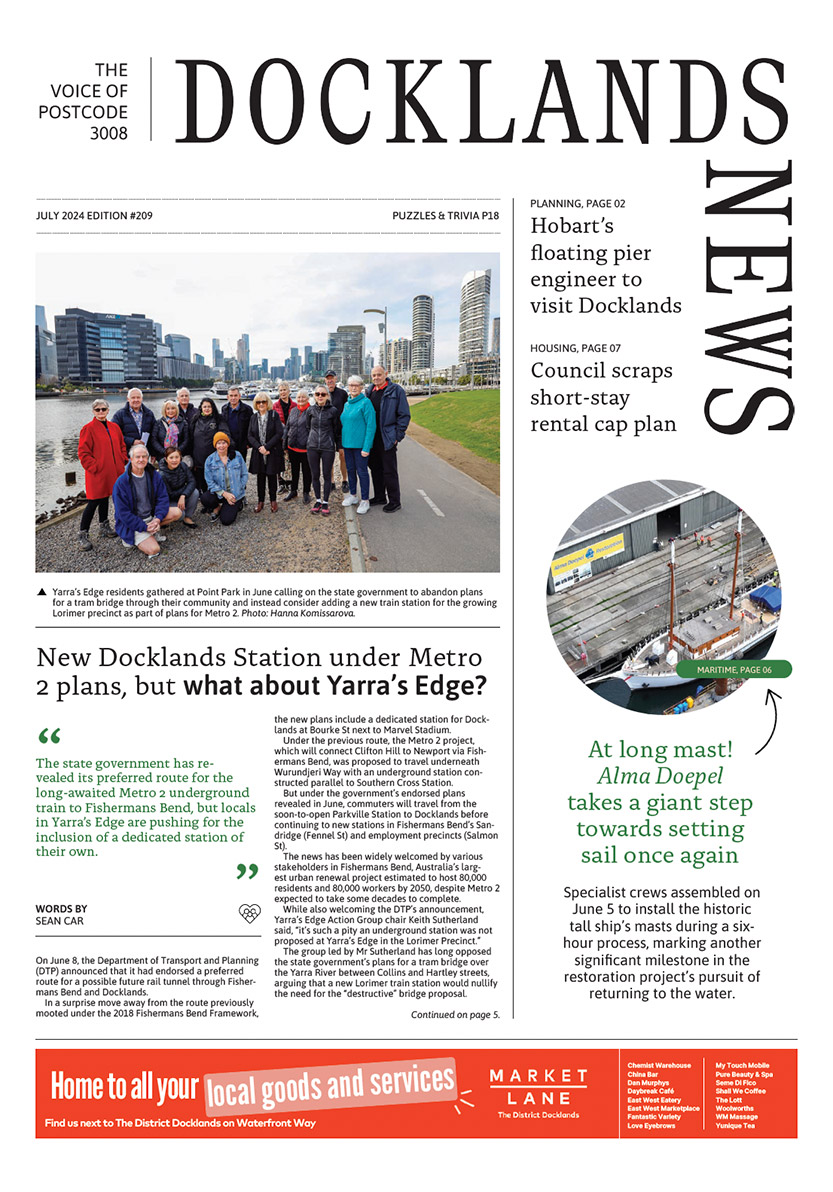Almost half of Docklands’ shopfronts vacant: report
By David Schout
Docklands is one of Australia’s worst-hit COVID areas after a report confirmed 47 per cent of street-facing businesses were currently vacant due to the pandemic.
A City of Melbourne survey of businesses shopfronts found that in December 2020, just 53 per cent remained occupied.
The numbers were far worse in Docklands than the rest of the municipality as the CBD, Southbank and Carlton each recorded more than 70 per cent occupied shopfronts.
Given the City of the Melbourne is already one of the worst hit local government areas in Australia due to COVID-19, the report confirmed Docklands as one of the nation’s most-impacted local economies.
“It is a very sad time for our precinct,” Docklands Chamber of Commerce (DCC) president Johanna Maxwell said in response to the report.
“The mood is very grey and dark. A few businesses are optimistic about trading well and have been rewarded through their efforts during COVID lockdowns but the great majority are very pessimistic.”
Of the 47 per cent unoccupied street-facing businesses in Docklands, 25 per cent were “temporarily closed” and 22 per cent were listed as “vacant”.
Mrs Maxwell said that local businesses in Docklands felt “neglected”.
“That this has been absolutely devastating but also that because it has backed on to the closure of Central Pier many are feeling neglected by the state government and the City of Melbourne,” she said.
“Most of our trading members have had revenue falls of 70 per cent. That’s not just restaurants and retailers, that’s all the service businesses — printers, hairdressers, allied health etc. They’ve been forgotten about in these lockdowns.”
The council’s Streetfronting Business Vacancy Report was part of a wider economic recovery update that portrayed a troubling outlook.
The report concluded that while the local economy had shown signs of improvement after stage four restrictions were eased in late 2020, the recovery levels were not sustainable.
Pedestrian numbers, for example, had only bounced back briefly.
“In the period leading up to Christmas we had a few days that were even better than last year. But that was brief, and following Christmas, pedestrian numbers declined again,” the council’s director of economic development Andrew Wear said.
Lord Mayor Sally Capp said the data was “compelling”, while Deputy Lord Mayor Nicholas Reece called it “extremely worrying”.
In response, Cr Capp pledged to meet with federal treasurer Josh Frydenberg and state treasurer Tim Pallas to urge targeted city support beyond March 28.
Two key business support packages were due to expire at the end of the month; the federal government’s JobKeeper payments, and the state government’s commercial tenancy relief scheme.
Mrs Maxwell confirmed with Docklands News that some traders had predicted conditions to worsen at the end of March.
“Without a dramatic change, further hurt is coming when JobKeeper payments end,” she said.
Cr Capp said this issue would be top of the list in the meeting where she would urge “targeted” assistance to reach “the hardest hit”.
“Melbourne’s businesses need certainty and confidence. We’re going to keep saying it over and over again,” she said.
“We would like the state and federal government to be considering, particularly as we head into budget time, extra direct financial assistance for businesses here in the City of Melbourne that have borne the brunt of the economic fallout of this pandemic.”
Cr Davydd Griffiths said that beyond the numbers, each of the municipality’s 20,632 businesses currently receiving JobKeeper had their own story to tell.
“We can look at data about businesses, but of course each of those businesses represent real human beings; owners, workers and the communities that interact with those businesses daily,” he said.
The state government announced on February 26 that three-quarters of workers across both the public and private sector could return to the office.
Docklands small businesses in particular have suffered from the rapid downturn in office workers as a result of the pandemic.
Mrs Maxwell said she was unsure when, if ever, the local economy could return to pre-pandemic levels.
“To be honest, without some dramatic investment and long-term plan, it might never return. With corporates accounting for almost 100,000 employees daily in Docklands the current model is dependent on their daily investments. If that doesn’t return, then Docklands needs to reinvent itself.”
She said the Chamber of Commerce was doing all it could to continue its advocacy and practical support for the area, including Docklands Dollars scheme (details page 1).
From Monday March 1, 75 per cent of the workforce was permitted to return to offices in what will come as a boost to Docklands.
The AFL also announced in February that 50 per cent of its Melbourne stadium capacity would also be permitted to return, meaning nearly 29,000 fans will be able to attend games at Marvel Stadium •

Neighbourhood Watch and RACV launch apartment crime prevention program








 Download the Latest Edition
Download the Latest Edition